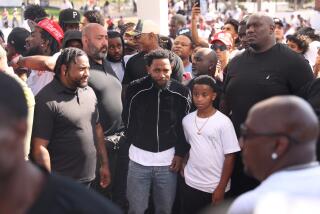After secret air surveillance of Compton, mayor wants protections

News of an air surveillance program from 2012 has led Compton Mayor Aja Brown to propose a policy that would require authorities to notify the public before installing monitoring equipment.
After learning this week of a nine-day aerial surveillance program conducted in 2012, Compton Mayor Aja Brown proposed a policy that would require authorities to notify the public before installing monitoring equipment.
“There is nothing worse than believing you are being observed by a third party unnecessarily,” Compton Mayor Aja Brown said Wednesday. “We want to assure the peace of mind of our citizens.”
The proposal for the so-called “citizen privacy protection policy” came amid public outrage among Compton residents who were never notified of the pilot surveillance program and said it amounted to an invasion of privacy. For nine days in early 2012, a small Cessna plane recorded low-resolution images of every corner of the 10.1-square-mile city and beamed them to the local Sheriff’s Department station, where deputies observed incidents including fender benders, a string of necklace snatchings and a shooting.
MAPPING L.A.: Crime in Compton
The program -- first revealed in a report by the Center for Investigative Reporting, an Emeryville, Calif.-based journalism nonprofit -- provoked complaints by civil libertarians as well as doubts from a technologist about whether the video images were intrusive enough to truly thwart crime.
Ross T. McNutt, president of Persistent Surveillance Systems, which operated the aerial program, said the images beamed back by the cameras were so sweeping that each individual appears as a single pixel -- ot nearly discerning enough to detect race, sex and other distinguishing characteristics.
And only images tied to known crime scenes received close scrutiny, he said.
But Peter Bibring, an attorney for the ACLU of Southern California, said the lack of public notice and the far-flung nature of the videotaping troubled him.
“So the [Sheriff’s Department was] surveying the entire city,” he said, “in the hope of catching very few.”
Residents of a city historically plagued by crime expressed mixed emotions when told about the video flyovers.
“Why are we the target?” asked Ellen Harris, 67, as she unloaded a cart full of groceries into her car. “As citizens we deserve [to know]. We are not all criminals.... It’s an invasion of privacy.”
But Compton is already coming under greater surveillance, with plans to install about 75 cameras along major thoroughfares at a cost of $2.7 million. In fact, Compton rejected the aerial observation, in part because it had already been satisfied with the results it got from 15 video cameras installed in nine city parks, said City Manager Harold Duffey.
The Sheriff’s Department defended its actions in the pilot program, saying that it was short-lived and that Compton residents already had a sense that they could be under surveillance because they had been told of other on-ground video monitoring in the city.
“Citizens weren’t notified because cameras were already installed in Compton on the ground,” said Nicole Nishida, a Sheriff’s Department spokeswoman.
But the investigative reporting unit quoted sheriff’s Sgt. Doug Iketani as saying that the temporary deployment of the spy plane was kept secret from the public intentionally.
“A lot of people do have a problem with the eye in the sky, the Big Brother,” Iketani told the news outlet, “so in order to mitigate any of those kinds of complaints, we basically kept it pretty hush-hush.”
More to Read
Sign up for Essential California
The most important California stories and recommendations in your inbox every morning.
You may occasionally receive promotional content from the Los Angeles Times.












